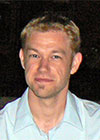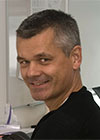New group leaders at BRIC
The appointment of two new Group Leaders Jesper Andersen (BRIC) and Kim Theilgaard (Finsenlab) underpins a strategic effort to strengthen the translational research at BRIC.
 Jesper Andersen was appointed Group Leader at BRIC by January 1st 2014. Prior to this he was a Research Fellow at the Center for Cancer Research, National Cancer Institute, Maryland, US. The major aim of Andersens research group will be to understand tumor heterogeneity. To achieve this, the group will focus on genomics- and epigenomics-driven translational medicine with an emphasis on patient classification and characterization, and prognostic or predictive biomarker discovery, to aid novel therapeutics and clinical efficacy.
Jesper Andersen was appointed Group Leader at BRIC by January 1st 2014. Prior to this he was a Research Fellow at the Center for Cancer Research, National Cancer Institute, Maryland, US. The major aim of Andersens research group will be to understand tumor heterogeneity. To achieve this, the group will focus on genomics- and epigenomics-driven translational medicine with an emphasis on patient classification and characterization, and prognostic or predictive biomarker discovery, to aid novel therapeutics and clinical efficacy.
- The appointment as Associate Professor and Group leader at BRIC is a culmination of many years of research. The past 11 years, my family and I have lived on the East coast of USA, and we are excited about our new life in Denmark. I am very pleased to have been offered this opportunity to join BRIC, a young and dynamic research institution. This move is going to enrich my research program, which is focused on the application of translational genomics in understanding tumor heterogeneity, patient stratification and therapeutic options with a emphasis on liver cancer.
 Kim Theilgaard-Mönch, MD, DMSc, and Associate Professor was appointed Group Leader at Finsen Laboratory/BRIC by February 2014.
Kim Theilgaard-Mönch has been affiliated with the Finsen Laboratory/BRIC since 2011 and also holds a clinical position at the Dept. of Hematology, University of Lund. In 2013 he received a Clinical Research Stipend from the Novo Foundation.
Kim Theilgaard-Mönch, MD, DMSc, and Associate Professor was appointed Group Leader at Finsen Laboratory/BRIC by February 2014.
Kim Theilgaard-Mönch has been affiliated with the Finsen Laboratory/BRIC since 2011 and also holds a clinical position at the Dept. of Hematology, University of Lund. In 2013 he received a Clinical Research Stipend from the Novo Foundation.
Kim Theilgaard-Mönch uses his stipend to combine genomic strategies with preclinical therapeutic programmes to improve prognostification and develop targeted therapies for cancer patients with Acute Leukemia.
- I am very pleased to have been appointed Group Leader. It enables me to continue my translational research project, bridging the gap between biology, prognostification, and treatment of cancer with emphasis on patients suffering from Acute Leukemia.
